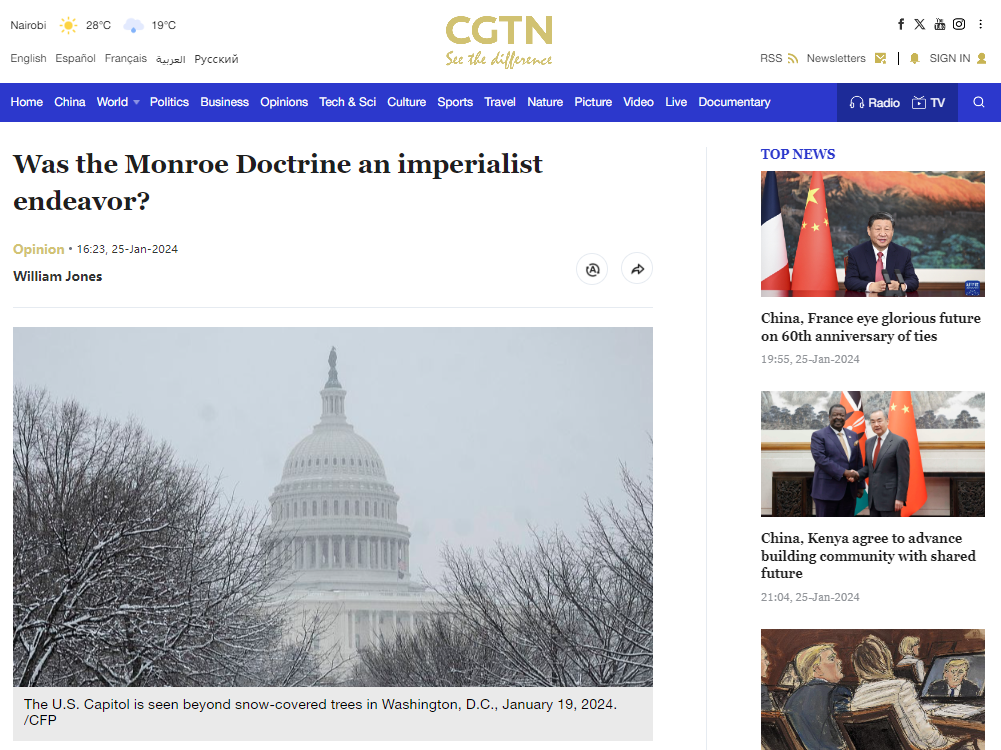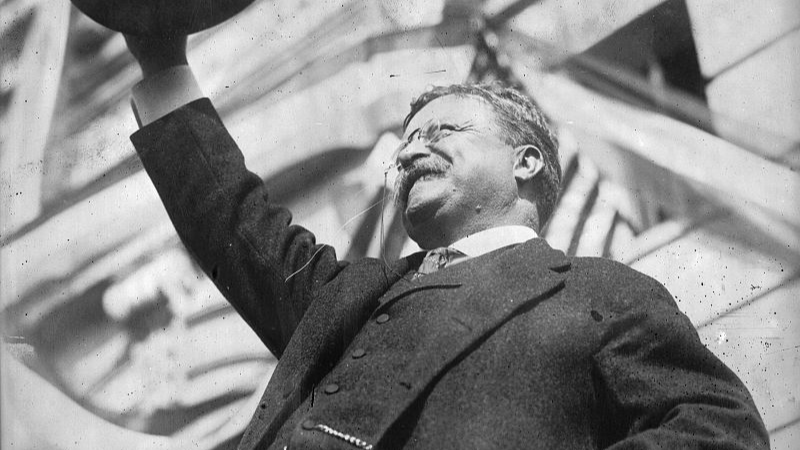LATEST INSIGHTS
Your Present Location: LATEST INSIGHTSWilliam Jones: Was the Monroe Doctrine an imperialist endeavor?
Source: CGTN Published: 2024-01-25

For 200 years, the U.S. has viewed the Americas as its backyard with the Monroe Doctrine as the rationale. Now the Monroe Doctrine is being 'dusted off' by Administration officials and U.S. politicians in an attempt to regain control over nations in Latin America who are looking elsewhere, primarily to China, for their development needs.
But in the heat of the debate, which is extremely important for the future of the world, the 'doctrine' announced by James Monroe, at best a somewhat mediocre president, but inspired by John Quincy Adams, one of America's greatest secretaries of state – and later president – the nature of the original Monroe Doctrine, in the eyes of its originators, has been severely obfuscated thanks mainly to former U.S. President Theodore Roosevelt, who transformed it into his 'big stick.'
Often enough, in press coverage, both in the U.S. and China, the Monroe Doctrine is interpreted as a Trump-like 'America for Americans,' namely an attempt to ensure U.S. control over all the countries of the Americas. In effect, however, the Monroe Doctrine, in the eyes of Adams and Monroe, dealt a significant blow to colonialism. At the time, the United States was by and large the only 'sovereign nation' in the Americas. The rest of 'the Americas' were simply colonies of the European powers, England, Spain, and Portugal, and even the Netherlands. These were the same powers that were running rampant in Asia, bringing economic brigandage and opium.
What the Monroe Doctrine stated was simply that any nation in the Americas, that had fought itself free from the colonial yoke, should not again be brought under it. By the Monroe Doctrine, the young United States would bring its political support to those nations.

Former U.S. President Theodore Roosevelt. /CFP
It was clearly stated that the United States would not interfere in those countries which were clearly under the control of a colonial power. If, however, those countries achieved their independence from the colonial powers, the U.S. would be prepared to support them.
This didn't mean that the U.S. would intervene militarily. In those days, there was little possibility for that to occur. Before the emergence of 'dollar diplomacy' at the end of the 19th century, the only such 'intervention' was in 1865, just after the Civil War, when Mexico's elected president, Benito Juarez, was in danger of being overthrown by a British-French military coalition which intended to implant the Habsburg heir, Maximilian, on the 'throne' of Mexico, former U.S. President Abraham Lincoln sent troops under General Phil Sheridan to the Mexican border to let the imperial powers know that Juarez was not alone.
With the expansion of American capital abroad in the 1880s, much of this changed. Growing economic involvement in the economies of Latin America led to calls on the government by investors to play a more active role in protecting their investments in what were often rather unstable nations.
This led President Theodore Roosevelt to transform the Monroe Doctrine into a tool, which neither Monroe nor Adams, would accept, creating the United States as an 'enforcer' of what the U.S. considered the 'rule of law.' As Roosevelt wrote in his address in 1905, outlining what would be called the 'Roosevelt corollary' to the Monroe Doctrine: 'If a nation shows that it knows how to act with reasonable efficiency and decency in social and political matters, if it keeps order and pays its obligations, it need fear no interference from the United States. Chronic wrongdoing or an impotence that results in a general loosening of the ties of civilized society, may in America, as elsewhere, ultimately require intervention by some civilized nation, and in the Western hemisphere the adherence of the United States to the Monroe Doctrine may force the United States, however reluctantly, in flagrant cases of such wrongdoing or impotence, to the exercise of an international police power.'
Here is the crux of the problem today. The Anglophile President Theodore Roosevelt, who desired to transform the American Republic into a new British (or Roman) Empire instituted a wholly new 'doctrine.' Rather than treat the British Empire as the strategic foe of the United States, which it had been for more than 100 years, he would transmogrify the United States into its replica in alliance with the old British oligarchs.
The argument that the world has today is not with James Monroe, nor with the most enlightened policy of John Quincy Adams, but rather with the tradition of Teddy Roosevelt. The problem with American elites today is that they too have forgotten the words of Quincy Adams, who warned America not to go out in the world 'seeking monsters to slay,' and remember only the tradition of Teddy, rather than Franklin, Roosevelt in its misbegotten attempt to become the 'policeman of the world.'
William Jones, a special commentator on current affairs for CGTN, was the White House correspondent for EIR News Service and is a non-resident fellow of the Chongyang Institute for Financial Studies.























































































 京公网安备 11010802037854号
京公网安备 11010802037854号





